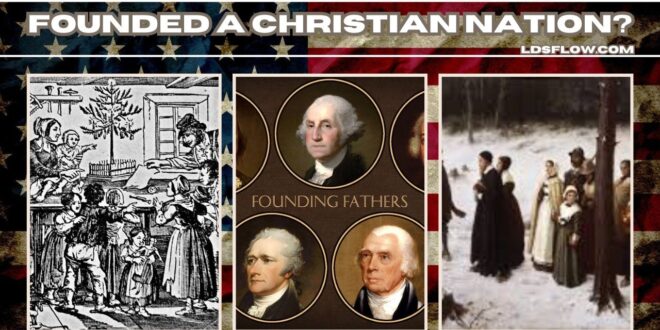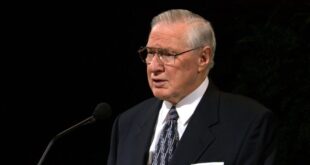To our Latter-day Saint readers: As we explore the evidence that America was founded as a Christian nation, we recognize the unique perspective your faith brings to this topic. The Church of Jesus Christ of Latter-day Saints teaches that America’s founding was divinely inspired, aligning with our discussion of the nation’s Christian roots. As you read about the historical and cultural evidence of America’s Christian foundation, consider how your beliefs about the inspired Constitution, America’s role in God’s plan, and the Book of Mormon’s teachings about this promised land further support this concept. Your faith’s understanding of America’s divine purpose adds a powerful dimension to our exploration of the country’s Christian heritage.
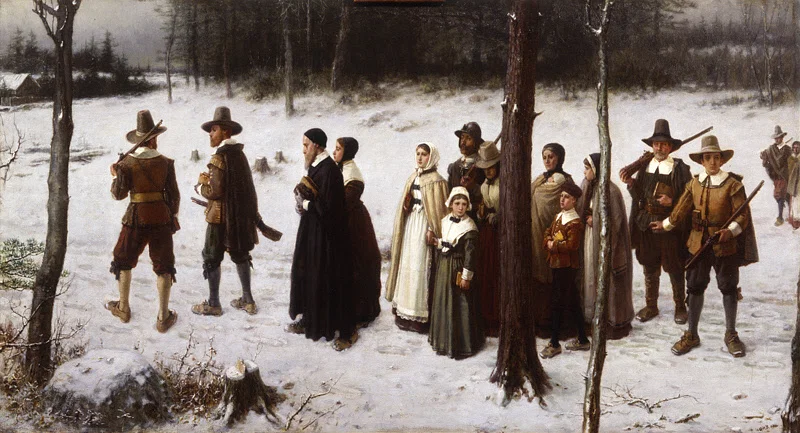
America’s Christian Heritage: The Undeniable Truth
In today’s world of revisionist history, it’s crucial to set the record straight about America’s Christian foundations. Our nation was built on Christian principles, and this truth is evident in every aspect of our history and culture. Let’s delve deep into the facts that prove America’s Christian heritage.
The Founding Fathers: Men of Christian Faith
Make no mistake: the vast majority of our Founding Fathers were devout Christians. Out of the 55 delegates to the 1787 Constitutional Convention, a staggering 53 were members of Christian denominations. Only two – David Brearly and Jonathan Dayton – were not. This isn’t a coincidence; it’s a clear indication of the Christian worldview that shaped our nation’s birth.

These men didn’t just nominally belong to churches. Their faith informed their decisions, guided their morals, and influenced the very framework of our government. From George Washington to John Adams, from Thomas Jefferson to Benjamin Franklin, our Founding Fathers repeatedly invoked God’s providence in their writings and speeches.
The Constitution: Undeniably Christian
While many try to downplay the religious aspects of our Constitution, the truth is inescapable. The document concludes with a clear Christian reference: “Done in Convention by the Unanimous Consent of the States present the Seventeenth Day of September in the Year of our Lord one thousand seven hundred and Eighty seven.”
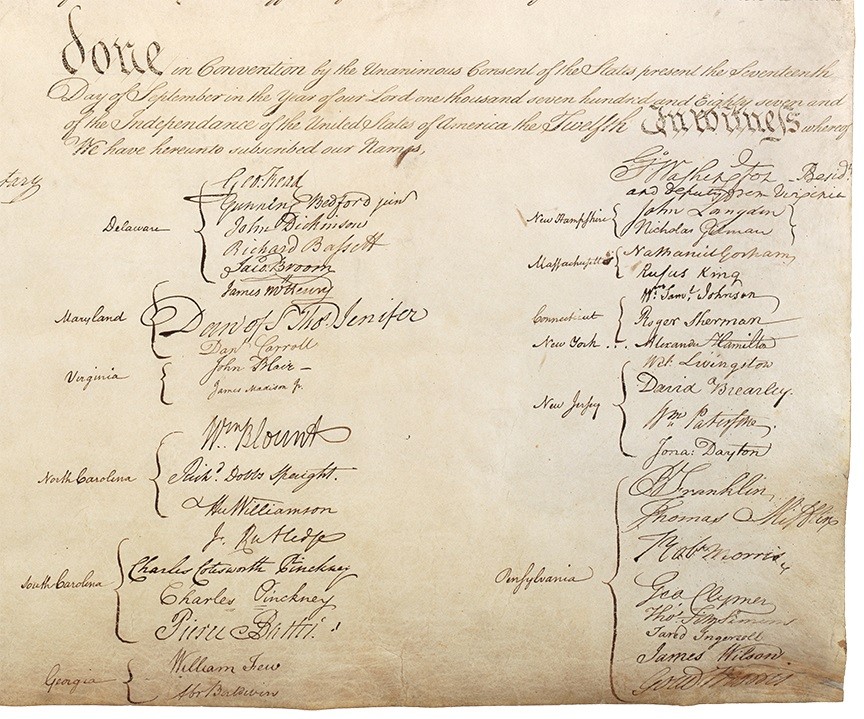
“In the Year of our Lord” – this phrase unequivocally refers to Jesus Christ. Not Buddha, not Muhammad, not any other religious figure. This dating convention, known as Anno Domini (A.D.), was standard in Western countries and its inclusion in our most important founding document is no accident. It’s a testament to the Christian context in which our nation was born.
America’s Christian Rhythm: The Sunday Tradition
From the beginning, America’s weekly rhythm has been set to a Christian beat. Sunday, the Christian Sabbath, became our nation’s day of rest. This wasn’t arbitrary – it was a direct result of our Christian heritage.
Even today, federal buildings are closed on Sundays. Most businesses operate on a Monday to Friday schedule, with limited hours on Saturdays and often closure on Sundays. This pattern isn’t due to random chance or secular convenience. It’s a living legacy of our nation’s Christian roots.
Federal Holidays: Celebrating Our Christian Heritage
Look at our federal holiday calendar, and the influence of Christianity is unmistakable. Christmas, a celebration of Christ’s birth, is a federal holiday. Thanksgiving, while not exclusively Christian, has strong Christian undertones in its emphasis on giving thanks to God for His blessings.

Even holidays like New Year’s Day and Independence Day, while not explicitly religious, fall within the Christmastide and Octave of Christmas in the traditional Christian calendar. This alignment is no coincidence – it’s a reflection of how deeply Christianity is woven into the fabric of American society.
The Pervasive Impact of Christianity on American Culture
From our laws to our social norms, from our art to our literature, Christianity has left an indelible mark on American culture. Our concepts of justice, equality, and human rights all have roots in Christian theology. The idea that all men are created equal, as stated in the Declaration of Independence, stems directly from the Christian belief that all humans are made in God’s image.
Our nation’s great universities – Harvard, Yale, Princeton – were all founded as Christian institutions. Our tradition of public education was born out of the Protestant desire for all believers to be able to read the Bible. Even our charity and welfare systems have their origins in Christian concepts of compassion and caring for the less fortunate.
Early American Flags and Christian Symbolism
In our discussion of America’s Christian heritage, it’s crucial to mention the symbolism present in early American flags, particularly the Liberty Tree flag. This flag, while not the first official flag of the United States, played a significant role in the American Revolution and clearly demonstrates the Christian influence on our nation’s earliest days.
The Liberty Tree flag featured a green pine tree on a white background with the phrase “An Appeal to Heaven” prominently displayed. This wasn’t just a catchy slogan – it was a profound statement of faith and a direct reference to Christian beliefs.
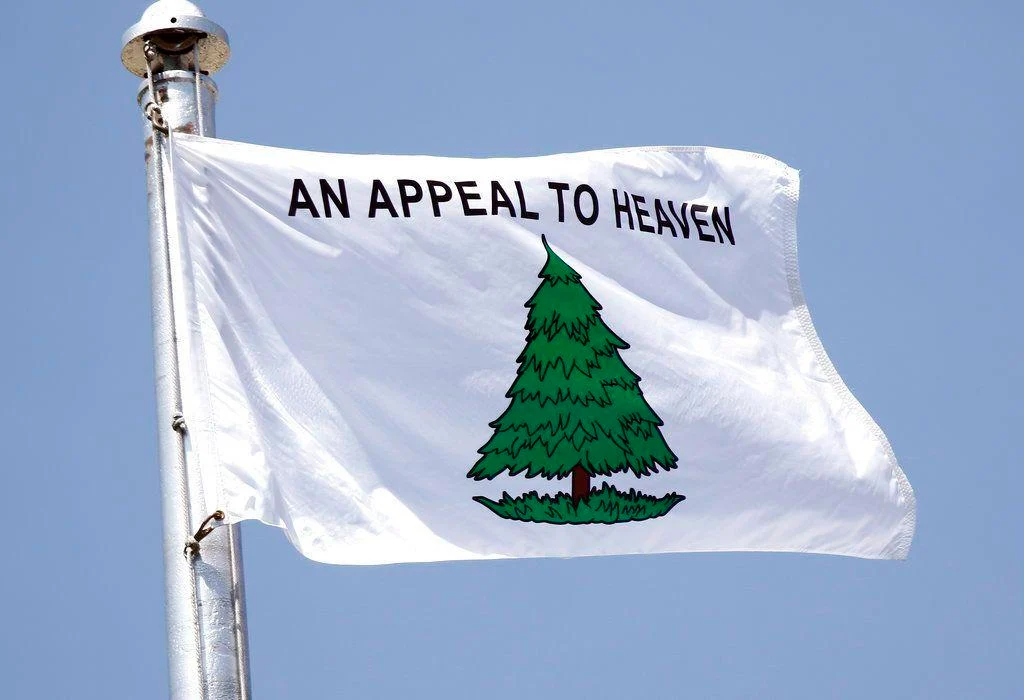
The phrase “Appeal to Heaven” comes from philosopher John Locke’s work on natural law theory, which was heavily influenced by Christian thought. It suggests that when all earthly options for justice have been exhausted, people have the right to appeal to God for help. By using this phrase, our forefathers were explicitly stating their reliance on divine providence in their fight for independence.
This flag was flown on many colonial warships and became a symbol of American resistance. Its widespread use demonstrates how deeply Christian concepts were woven into the fabric of the revolution. Our founders weren’t just fighting for political freedom – they were engaged in a struggle they saw as sanctioned by God Himself.
The Liberty Tree flag is just one example of how Christian symbolism and ideology permeated early American patriotic symbols. From the Eye of Providence on the Great Seal of the United States to the numerous references to the Divine in state seals and mottos, our nation’s Christian heritage is clear for all who are willing to see it.
This flag, and symbols like it, serve as tangible reminders of the strong Christian foundation upon which our nation was built. They challenge us to remember and honor this heritage as we continue to shape America’s future.
Oaths of Office
The tradition of swearing oaths on the Bible dates back to our nation’s founding. George Washington began this practice at his first inauguration in 1789, adding “So help me God” to the end of the oath. While not constitutionally mandated, this has become a de facto part of the presidential oath. Most presidents have followed this tradition, placing their hand on a Bible (often open to a specific verse) while taking the oath of office. This practice extends to many other government positions at federal, state, and local levels, demonstrating the enduring influence of Christian tradition in our civic life.
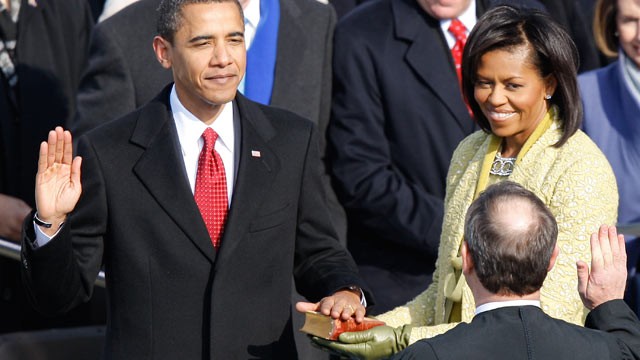
Blue Laws
Blue Laws, which restrict certain activities on Sundays, were common in early America and some persist to this day. These laws, rooted in Christian observance of the Sabbath, have regulated everything from alcohol sales to retail operations. While many have been repealed, some states still maintain versions of these laws:
- In Bergen County, New Jersey, most retail stores are closed on Sundays.
- Many states, including Texas, Minnesota, and Pennsylvania, restrict car sales on Sundays.
- Several states, like Indiana and Utah, have restrictions on Sunday alcohol sales.
- In Massachusetts, many retailers must pay premium wages for Sunday work.
These laws, even where they persist, are often controversial and face legal challenges. However, their existence and history clearly demonstrate the influence of Christian practices on American law and society.
Education
The roots of American public education are deeply entwined with Christianity. Many early schools were established by churches, and Bible reading was a common part of the curriculum. The New England Primer, one of the first textbooks used in American schools, was filled with Biblical references and religious instruction.
Many of America’s oldest and most prestigious universities were founded with explicitly Christian missions:
- Harvard (1636): Originally established to train Puritan ministers.
- Yale (1701): Founded by Congregationalist ministers.
- Princeton (1746): Founded by New Light Presbyterians.
- Columbia (1754): Founded by the Church of England.
While these institutions have since become secular, their Christian origins underscore the profound influence of Christianity on early American education.
Presidential Proclamations
Throughout American history, presidents have issued proclamations calling for national days of prayer, fasting, or thanksgiving. Some notable examples:
- George Washington’s 1789 Thanksgiving Proclamation, which called for a day of public thanksgiving and prayer.
- Abraham Lincoln’s proclamations during the Civil War, calling the nation to fasting, prayer, and thanksgiving.
- Franklin D. Roosevelt’s D-Day prayer, broadcast to millions of Americans in 1944.
These proclamations, while careful to respect the diversity of American religious beliefs, often invoked Christian themes and language.
Mottos and Inscriptions
Christian-influenced mottos and inscriptions are prevalent in American civic life:
- “In God We Trust” became the official motto of the United States in 1956, but it had appeared on some U.S. coins since 1864.
- “One Nation Under God” was added to the Pledge of Allegiance in 1954.
- “Annuit Coeptis” (“He [God] has favored our undertakings”) appears on the Great Seal of the United States and on the back of the one-dollar bill.
- Many federal buildings and monuments in Washington, D.C., including the Washington Monument and Lincoln Memorial, feature Biblical inscriptions or references to God.
Northwest Ordinance
The Northwest Ordinance of 1787, one of the most important laws of the early United States, included this notable statement: “Religion, morality, and knowledge, being necessary to good government and the happiness of mankind, schools and the means of education shall forever be encouraged.”
This law, which predated the Constitution, clearly linked religion (implicitly Christianity) with good governance and education. It set a precedent for the importance of religion in public life that would influence American society for generations to come.
Religious Freedom: A Christian Principle
Yes, America champions religious freedom. The First Amendment guarantees the right to practice any religion or none at all. But let’s be clear: this principle of religious freedom itself stems from Christian thought. The idea that faith should not be coerced, but freely chosen, has its roots in Christian theology.
The Founding Fathers, informed by their Christian worldview and the bitter religious conflicts of Europe, enshrined religious freedom in our Constitution. This wasn’t a rejection of Christianity, but an implementation of Christian principles of free will and individual conscience.
Conclusion: Embracing Our Christian Heritage
It’s time to stop apologizing for or trying to hide America’s Christian heritage. The facts are clear and undeniable: America was founded as a nation deeply influenced by Christian thought and principles. From our Founding Fathers to our Constitution, from our weekly rhythms to our holidays, from our culture to our very concept of freedom – Christianity has shaped every aspect of our nation.
This doesn’t mean that America isn’t welcoming to people of all faiths or no faith. On the contrary, our Christian heritage is what guarantees this openness. But we do a disservice to our history and to ourselves when we try to erase or minimize the crucial role that Christianity has played in making America the great nation it is today.
Let’s embrace our Christian heritage. Let’s acknowledge it, celebrate it, and let it continue to guide us as we face the challenges of the future. For it is this heritage that has made America a beacon of hope and freedom for the world.
